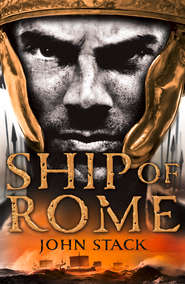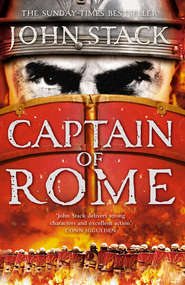По всем вопросам обращайтесь на: info@litportal.ru
(©) 2003-2025.
✖
Masters of the Sea Trilogy: Ship of Rome, Captain of Rome, Master of Rome
Автор
Год написания книги
2019
Настройки чтения
Размер шрифта
Высота строк
Поля
‘The time the legions in Sicily have.’
Tuditanus nodded, although Atticus could clearly see it was not in agreement.
‘You’re Greek, are you not, Captain?’
‘Yes, but I don’t see—’
‘And you believe the orders of your Roman commander are ill-advised?’ Tuditanus asked, cutting Atticus short.
Once again Atticus held his words, anger flaring in him as he was confronted anew by Roman arrogance. He breathed deeply, his mind searching for a way to persuade the camp prefect that the orders were wrong without saying as much.
‘I know Lentulus chose a traditional design to speed up construction because his apprentices and many of the craftsmen have built identical galleys in the past. But I also know that the Carthaginian galleys are stronger than our own and their crews more skilled – and we can’t be guaranteed victory if we rely on the ram.’
Tuditanus circled and stood once more behind his desk, bunching his fists as he leaned forward.
‘You Greeks are all the same. You underestimate Rome, Perennis, with the same arrogance your ancestors did.’
Atticus made to protest again but Tuditanus silenced him with a raised hand. ‘Now let me be very clear on this,’ he continued, his gaze piercing, ‘the sailing crews will be trained how to ram and you will make that your priority. If I hear that you are doing otherwise, I’ll have you and your crew flogged before the entire camp. Now get out of my sight.’
Atticus saluted and turned on his heel, the acid rising in his stomach as he fought to suppress his anger. Minutes later he was back at the water’s edge, kicking the hull of the skiff to waken the two crewmen who were instantly at the oars, their captain’s dark mood quickening their oar-strokes as they skulled through the darkness.
Scipio crested the windblown dune at the head of the beach south of Fiumicino and paused, allowing his stallion to breathe easy after the twelve-mile gallop from the city. His guard detail of four mounted praetoriani halted ten paces behind him. The senior consul had left his town house in the half-light an hour before dawn, and now, forty minutes later, it was as if he had travelled to the shore of a distant land. The southern beach before him was deserted and seemed unworldly after the enclosed, cramped streets of the capital and the busy northern trade road, the Via Aurelia, five miles inland. Scipio breathed deeply, the cleansing, salt-laden onshore breeze fresh in his face.
The final decisions on the fleet had been made over a week before, and since then he had been working tirelessly on the organizational elements of the plan, his position as fleet commander giving him overall responsibility for the task. With the full support and power of the Senate behind him, Scipio had issued a number of sweeping decrees which immeasurably speeded up the process. Entire crews were drafted from the trading populace of Ostia. An army of slaves had been commandeered from the surrounding estates and towns to provide labour. Their combined strength would be used to construct the fleet and then it would be harnessed to propel the ships through the water as each slave would be sent to man the oars of the very ships they built. Fleets of transport barges had also been requisitioned and the vital raw materials they carried seized by order of the Senate. The decrees had been brutal. Scipio had no doubt that many traders had already lost their livelihood as a result of the enforced orders and yet he felt no remorse. Rome was threatened, therefore Rome must react. If individuals had to be sacrificed for the greater good then so be it. History would remember men like Scipio and the glory of Rome. No one would remember the casualties.
The senior consul swept his eyes northwards, to the beach on the other side of the small fishing village that straddled the mouth of the river. The area was beginning to come alive, the sun’s imminent arrival signalling the start of the working day. Scipio spurred his horse and trotted down onto the almost stone-hard sand. His guard followed. The group crossed the river at the edge of its mouth, where the ground met the incoming tidal waves. The dual action created a natural ford and the shallow water splashed high as the horses’ hooves cut its surface. Once on the other side the group turned up the beach, passing the frame of a partially constructed trireme as they did so. This was the first time Scipio had been to the site and his eyes swept over every detail before him, the endless lists he had reviewed in Rome made real on the beach at Fiumicino. The galley frame was almost lost in a forest of supports and yet Scipio could make out the sharp lines of the vessel beneath. Even now, although it was only partly built and was caged by scaffolding, the galley looked as if it would soar over the water, and Scipio felt a surge of admiration for the craftsmanship of his fellow Romans.
Scipio counted twenty frames in number, the exact total he had seen on an obscure list a week before. When the decision had been made to build the fleet, there had only been sufficient material and skilled labour available in the immediate vicinity of Rome to construct these twenty ships. Even now supplies were arriving and being distributed that would fuel the construction of a further one hundred and thirty galleys, but the twenty before him would put to sea first. Scipio entered the tented city and headed for the camp prefect’s quarters. A lantern was lit inside, the occupant already working diligently. Scipio had chosen Tuditanus personally, his choice based on two facts. The first, that Tuditanus was a hard taskmaster and would stick rigorously to any schedule, and the second, that Tuditanus was in Scipio’s employ and, while on the surface he might report to the Senate, in reality he answered only to the senior consul.
Septimus woke thirty minutes before dawn, his mind surfacing through a groggy fog of fatigue. As he rose he looked across the dark cabin to the sleeping figure of Atticus, his friend laid out as if he had been knocked unconscious. He crept from the cabin, gathering up his sword and shield as he did and climbed the aft-gangway to the deck above. The mood up top was subdued, the men on duty coming to the end of their watch as dawn approached. Septimus ordered one of them below to get him food while he washed his face with water in a futile attempt to refresh himself. Atticus emerged five minutes later, Septimus noticing that under the dark lines of fatigue on his face the captain was seething with anger.
‘I take it your meeting with Tuditanus didn’t go well?’ he prompted as Atticus took the basin of water and poured the contents over his head. A week before, Atticus had outlined his fears to Septimus, the centurion immediately deferring to his friend’s experience, sharing his impatience as they waited for Tuditanus’s summons.
‘The bastard completely ignored me. He said I was underestimating the Romans,’ Atticus replied, slamming his fist onto the railing as he looked out over the beach.
‘Maybe he has a point, Atticus,’ Septimus said. ‘Lentulus is a clever man and Tuditanus is no fool.’
‘So you think because I’m not Roman I’m wrong?’ Atticus countered, his anger rising anew.
‘That’s not what I said,’ Septimus replied, keeping his tone even, sensing that Atticus was close to losing his temper.
Atticus curbed his anger, knowing it was misplaced when directed at his friend.
‘So what now?’ Septimus asked.
‘Now I need your help,’ Atticus replied. ‘I can’t risk training the recruits yet on boarding manoeuvres, but we’ve got to give the legionaries a fighting chance. Can you train them on some of the techniques for boarding?’
‘My own orders call for me to demonstrate our knowledge of Carthaginian tactics, but I think I’ve enough scope to teach them some of the basics,’ Septimus smiled, liking the idea of circumventing the camp prefect’s orders.
Atticus nodded his thanks as he noticed a number of skiffs disembarking from the beach, each one filled with the sailing recruits who would spend their day on the Aquila. The sight prompted Septimus to make his way to the main deck before climbing over the side and down a rope ladder into the small skiff tethered to the galley. A crewman of the Aquila was waiting there for him, the week-old daily routine dictating the steps of both men. As Septimus sat down, the crewman pushed off and started to row towards the shore.
Septimus jumped out of the skiff into the ankle-deep water and walked up onto the beach. All around him the area was coming to life as drowsy men walked off their weariness and stretched tired muscles. A long day ahead. He crested the dune at the top of the beach and walked onto the flat coastal plateau behind, heading towards the hastily erected training camp at the northern end of the tented city, an expansive square of land that housed the legionaries of the Fourth, the Roman legion that had arrived at the beginning of the week. Septimus had been tasked with instructing one of the maniples on the fighting skills of the Carthaginians, specifically on how men trained in one-to-one encounters.
The centurion was challenged at the gate of the camp by two of the vigilae, the night guard, who, although three hours into their watch, stood alert and ready. A tightly run legion, Septimus thought, as he identified himself. He passed through and headed for the quarters of his own men, spotting Quintus, his optio, standing beside a fire with two of the twenty principes of the Aquila’s half-century. They were having a murmured conversation, keeping their voices low in the quiet time before dawn.
The optio spotted his commander approaching and broke away from the two men.
‘Good morning, Centurion.’
‘Morning, Quintus … all quiet?’
‘As a grave. With the work we have those legionaries doing, they’re sleeping like babies.’
Septimus smiled at the description. The men of the Fourth were anything but babies. As one of the legions of the northern army, the Fourth had historically been at the centre of all of the major conflicts as Rome expanded her borders northwards. Their symbol was the boar, and it was a suitable emblem, for the soldiers were both vicious and stubborn. Septimus realized that the latter quality would make the task ahead more difficult.
Septimus turned to his optio as a trumpet sounded for roll call.
‘Quintus, I want to shift the focus of training and teach the legionaries some of the basics of boarding.’
‘Yes, Centurion,’ Quintus replied, Septimus noticing the underlying scepticism in his optio’s voice. Having gone through the training only ten months before, the techniques and steps were fresh in Septimus’s mind; however, he would let Quintus, a marine with two full years’ experience, take the lead on the agenda.
‘So, what do you think is the best way to proceed?’
‘We introduce them to the hoplon.’
Septimus nodded, knowing that that portion of the training was especially difficult for men used to handling the four-foot scutum shields of the legions.
‘We have to start somewhere, and the sooner the legionaries realize that they don’t have a shield that will defend their torso and legs at the same time, the better,’ Quintus added.
‘Agreed,’ Septimus said, as the men of the V maniple of the Fourth formed up in the training square. Their centurion, Marcus Junius Silanus, approached and Septimus groaned inwardly. Silanus had absolutely no respect for marines, an opinion he constantly expressed both to Septimus and to the men of his own maniple.
‘What’s on today’s agenda, marine?’ he asked, his tone laced with condescension.
Septimus drew himself up to his full height, a good two inches taller than Silanus, the centurion’s tone goading him.
‘More of the same, Silanus,’ Septimus replied, ‘just teaching your boys how to fight.’
Silanus bristled at the slight against his maniple.
‘Look, marine,’ Silanus growled, ‘orders are orders – which means my maniple has to sit here and watch your men dance around all day, but don’t think for one second you can teach the V anything about real fighting.’ He turned on his heel and marched back to his men. Septimus watched him go, angry at himself for allowing Silanus to incite him into another round of insults. If he was going to prepare the legionaries for naval warfare, he needed to get Silanus on side.
An hour later, Quintus finished his demonstration to the assembled maniple of the Fourth. Septimus called for questions but none was forthcoming; he knew the silence was not because the men completely understood the techniques of fighting with a rounded hoplon shield, but rather because of the contempt the legionaries felt for the foreign shield. At the eye of that contempt was Silanus, the centurion providing a focal point of disdain for the marines and their method of fighting, and by extension the Carthaginians. Septimus caught the centurion’s eye and held his gaze. If the men of the V maniple were going to be trained, Septimus knew that Silanus would have to be taught first.
Lucius Fulfidias reached out from his position at the front of the small skiff and grasped the rope ladder. With a single fluid movement he swung his feet onto the rungs and quickly climbed onto the deck of the Aquila. The four other men in his skiff followed suit. He was the captain of the newly formed command crew, chosen because of his experience commanding trading galleys, while the other four men were his second-in-command, helmsman, boatswain and drum master. Four other skiffs were quickly alongside, each one containing the five men of a command crew. Once on board, Fulfidias followed the other trainee captains to the aft-deck where the young commander of the military trireme stood confidently beside his helmsman. Fulfidias sneered inwardly at the sight, disliking the man and what he represented, a servitude enforced by Rome – and the young pup wasn’t even Roman himself, he was a bloody Greek. Who in Hades was he to command a galley of the Republic?
Fulfidias was a trader from Naples, his ship a nimble bireme named the Sol. She was a small vessel, her cargo hold tiny in comparison to the gigantic trading barges, but she was fast and the shallow draught allowed her to berth at any port. It was this flexibility and speed that had given Fulfidias a niche in the markets of Ostia and Rome. For over ten years he had built a reputation of being the first to market with the pick of every season’s first crop. It was not a commodity for the common man, but one for the affluent of Rome who, as a sign of their status and wealth, liked to be the first to serve each new season’s bounty at their table when entertaining guests. Fulfidias traded primarily in new-season wines from the Gaulish coast, and first spring lambs and suckling pigs from Campania. It was a lucrative business, with the rich paying exorbitant prices to have goods merely weeks before their social peers.
Two weeks before, when the Roman military had begun trawling the port of Ostia for crews to man their new fleet, the Sol had been in dry dock, her hull undergoing repairs to damage caused by the odious shipworm that had dug deep into the timbers of the bireme. With his ship temporarily out of action, Fulfidias had been left with nowhere to go to, and he had been indentured into military service at the Senate’s pleasure.









